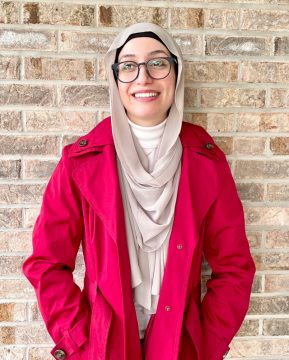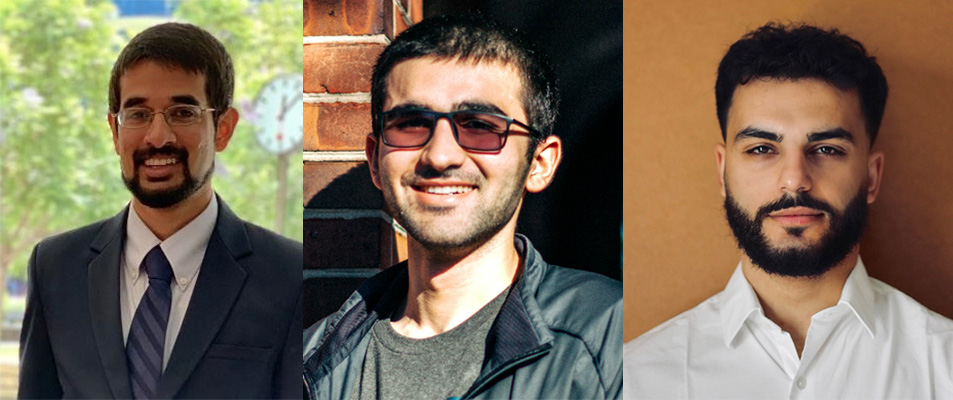Given annually to medical students in recognition of their commitment to addressing public health issues in their community, the competitive U.S. Public Health Service Excellence in Public Health Award rewards visionary medical students who are advancing initiatives to improve public health.
This is the eighth year in a row a Geisel student has received this award.
Third-year medical student Fatima Haidar ’23 has been recognized for her remarkable leadership in engaging numerous Geisel medical students in a true public health collaboration with the state of New Hampshire and nonprofit agencies throughout the Upper Valley, and in securing grant-funding to support this work to help welcome and support recently arrived Afghans in the Upper Valley.

“This is an extraordinarily advanced public health practice at the medical student level—especially during such a politically divisive time. The breath of students involved in these projects is incredibly diverse, including Muslim-American medical students and medical student veterans who previously served in Afghanistan,” says Alison Volpe Holmes, MD, MPH, associate dean for student affairs and associate professor of pediatrics at Geisel.
“As Geisel’s Diversity, Inclusion, and Community Engagement program coordinator and as a member of the Afghan diaspora, I have been advising Fatima and the Middle Eastern/North African Student Association (MENASA) about their New Hampshire-funded project to welcome Afghan refugee families to the Upper Valley. In the face of the ongoing humanitarian crisis in Afghanistan and delayed Congressional action around the asylum process, it has been heartening to witness Fatima’s dedication to vulnerable communities in her local community,” says Seelai Karzai.
The resettlement of displaced people in their host country is no easy task even for a recognized humanitarian assistance organization, Karzai says, “but Fatima has taken steps to welcome recently arrived Afghans with grace and kindness. She exemplifies the best qualities of a medical student who is keenly aware of the needs of an isolated and vulnerable people. Fatima, along with her peers, focuses on the whole individual and seeks to uplift families directly impacted by the violence of war and the U.S. withdrawal by focusing on all aspects of their social wellbeing.”
Haidar has a long history of dedication to underserved populations, particularly to refugees and children. Prior to medical school, she worked with Syrian refugees in Sidon, Lebanon as a student English teacher. In her home state of Michigan, she worked with Jewish Family Services to settle newly arrived refugees in and around Ann Arbor. And she has also spent time in Rabat, Morocco, where she worked in the social work department in the country’s largest public hospital.
Extensively involved in diversity and health equity advocacy at the medical school, Haidar was one of three medical student members on the initiatory Dean’s DEI Taskforce. She co-founded the MENASA at Geisel with fellow classmate Ahmed El-Hussein ’23, and the MENSA Refugee Health Program with El-Hussein, Omar Sajjad ’25, and Shahin Shahsavari ’25 to develop projects advancing the health and wellbeing of MENA (Middle Eastern/North African) refugee and immigrant patient populations. She also worked with undergraduates at Dartmouth College to ensure Muslim students have easy access to nutritious Halal meals.

Haidar, who has prioritized community service throughout her medical school training, spent her first year as a medical student serving the unhoused patient population during the COVID-19 pandemic through the telehealth program at the Good Neighbor Health Clinic in Vermont, with the goal of ensuring continuity of care to those most vulnerable to losing healthcare access.
During that time, she also worked to develop a community-based project, later supported by a Schweitzer Fellowship, to mitigate the adverse effects of the COVID-19 pandemic on childhood mental health and obesity in formerly or currently unhoused children at the Upper Valley Haven.
Since the fall 2021, Haidar, El-Hussein, Sajjad, and Shahsavari have been collaborating with the New Hampshire State Government’s Office of Health Equity, in addition to the state’s largest resettlement agencies—the International Institute, and Ascentria Care Alliance—to support the hundreds of Afghan refugees relocating to New Hampshire.
“Through these institutions, we conducted a community needs assessment that led to the discovery of a need for a standardized social support program,” Haidar explains. “We started MENSA Refugee Health Program because more than 80 percent of healthcare outcomes are dictated by social factors and there was no official Geisel student group dedicated to serving recent refugees or immigrants."
As a Farsi speaking immigrant, Shahsavari says, “I felt great joy assisting our new friends feel welcome in New Hampshire. I was very fortunate to have the opportunity to give back and hope to continue this endeavor in the years to come."
“With more than 100 medical student volunteers and approximately $3,000 in funding, we were able to create and distribute care packages to newly resettled Afghans; designed curricula for current and future healthcare providers on providing culturally-competent care to the Afghan refugees; distributed resources to mitigate the transmission of COVID-19 in underserved areas globally; partnered with the Rassias Center at Dartmouth to facilitate English as a Second Language classes to Afghan refugees in the Upper Valley. And yet to be launched, a project conducting patient needs assessments in conjunction with local resettlement agencies to ensure adequate and regular access to healthcare for the Afghan refugees.”
Without the help of her team, she says this work wouldn’t have been possible. El-Hussein, a refugee himself, dedicated his time creating social support networks for Syrian refugees prior to coming to Geisel, says, “Our mission as future physicians extends beyond health at the individual level—it encompasses the health of communities and populations as well.”
“The transition from Afghanistan to New Hampshire can be a difficult one, but we have found that fostering a sense of community markedly eases the adjustment process. Relatively simple measures such as regular check-ins, group prayers, and care packages can go a long way for our newcomers," Sajjad explains. "When I was living in Jordan in 2015, I observed the massive influx of refugees fleeing the Syrian Civil War. Their struggles to obtain proper healthcare and support systems have remained with me ever since and has helped inform my work with MENASA."
Haidar says the gravity of such work is rooted in the belief that over the past several decades, the U.S. government has been complicit in the destabilization of Afghanistan’s government. “As future physicians we believe it is our duty to rectify the government's past mistakes however we can,” she says, “acknowledging that our work is a minor step toward restorative justice for the innocent victims of Afghanistan.
“These projects are important to me because I hold myself to the standard of learning from and advocating for the communities I serve, both now and as a physician, so that I can foster strong therapeutic alliances with my patients and their communities.”

